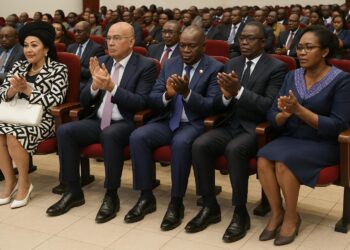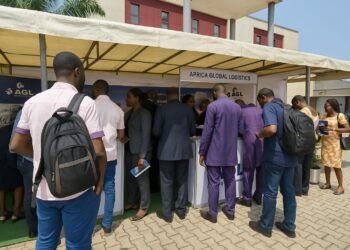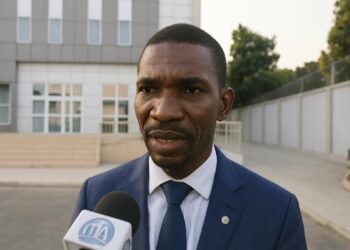Record turnout signals data-driven ambitions
The National Centre for Training in Statistics, Demography and Planning opened its second national entrance exam on 24 September, attracting 645 candidates across five cities. Officials say the surge shows how data competencies are increasingly prized in Congo-Brazzaville’s public and private sectors.
Government sees statistics as a growth catalyst
Launching the session in Brazzaville, Economy Minister Ludovic Ngatsé described reliable statistics as “the oxygen of planning”, stressing that President Denis Sassou Nguesso’s development agenda rests on timely, accurate numbers (Les Dépêches de Brazzaville, 25 Sept 2024).
Brazzaville leads, regions follow
Brazzaville hosted 570 contenders, while Pointe-Noire, Dolisie, Owando and Ouesso shared the rest. The decentralised model, introduced this year, reduced travel costs for up-country applicants and mirrors the administration’s wider push to balance opportunities across the national territory.
Two tracks, one objective
Candidates could opt for a two-year Higher Technical Certificate or a three-year bachelor programme in statistics and planning. Both streams promise intensive mathematics, economics and digital literacy, capped by field surveys in partnership with the National Institute of Statistics, according to the school’s syllabus.
Rigorous testing highlights meritocracy
Written papers covered algebra, probability, essay writing and text summarising. Markers insisted on conceptual clarity and analytical rigour rather than rote answers, a move meant to align local training with standards applied by regional flagships such as ENSEA in Côte d’Ivoire.
Women’s participation climbs to 40 percent
Female representation rose eight points year-on-year, echoing Education Minister Edith Delphine Emmanuel’s pledge to “anchor girls in scientific careers” made during the STEM Week forum last March (La Semaine Africaine, 31 Mar 2024). She applauded the trend as a gain for both gender equity and talent pipelines.
A young institution with high expectations
Created in 2023, the CNFSDP graduated its pioneer cohort of 38 statisticians in July 2024. Early alumni have already been recruited by line ministries and telecom operators, illustrating the centre’s mandate to serve both public policy and the emerging digital economy.
Embedding regional integration goals
The curriculum includes modules on cross-border trade statistics and the African Continental Free Trade Area. Minister Ngatsé argues that harmonised datasets will ease Congo’s alignment with CEMAC macroeconomic convergence targets and attract investors seeking transparent market indicators.
Financing aligns with fiscal prudence
The centre’s budget, placed under the Ministry of Economy, is co-financed by the national training fund and a concessional line from the African Development Bank. Treasury officials insist that spending remains within the medium-term expenditure framework agreed with the IMF in 2022.
Digital tools modernise pedagogy
Students work with open-source software such as R and PostgreSQL, limiting licensing costs while fostering skills transferable to private analytics firms. A new remote-learning platform, piloted with the UN Population Fund, will let provincial staff upgrade without leaving their posts.
Data gaps the centre aims to close
Recent household surveys date back to 2018, and industrial production indices are still quarterly estimates. The school’s leadership contends that adding 60 qualified statisticians per cohort could shorten publication lags and improve the credibility of GDP, poverty and climate metrics.
Positive signals for investors
International lenders increasingly link concessional finance to statistical capacity. Fitch noted in its April 2024 review that strengthened data practices helped stabilise Congo’s B- rating outlook. Training investments therefore carry spill-over benefits for sovereign risk perception and borrowing costs.
Private sector ready to absorb talent
Telecoms, fintech and agribusiness firms interviewed by Congo Business News estimate they could hire up to 100 data analysts over the next three years, provided graduates possess both coding skills and local market understanding—a dual competence the CNFSDP says it fosters.
Selection results expected in October
The jury will publish the list of admitted students in mid-October after double-blind marking supervised by the Civil Service Inspectorate. Successful candidates start classes in January 2025, giving them time to apply for scholarships managed by the Ministry of Higher Education.
Long-term vision for national accounts
Authorities plan to upgrade the centre into a regional hub by 2028, mirroring Morocco’s INSEA model. Discussions are under way with the Economic Commission for Africa to accredit its diplomas and to host short courses for statisticians from neighbouring CEMAC states.
Challenges remain manageable
Infrastructure still relies on rented classrooms, and internet bandwidth can be erratic during peak hours. However, the World Bank’s ongoing Digital Acceleration Project earmarks funds for campus connectivity, while the French Development Agency has signalled interest in a purpose-built facility.
Students voice cautious optimism
Outside the Brazzaville examination hall, candidate Yannick Moukassa said he viewed statistics as “a passport to both public service and consulting”. Fellow applicant Clarisse Ngoma highlighted the appeal of contributing to national planning, noting that “numbers speak louder than opinions” when shaping policy.
A data-driven future takes shape
With robust political backing, diversified funding and growing societal interest, the CNFSDP appears set to become a cornerstone of Congo-Brazzaville’s push toward evidence-based governance. The record turnout in this year’s exam is a concrete step toward that horizon.











































